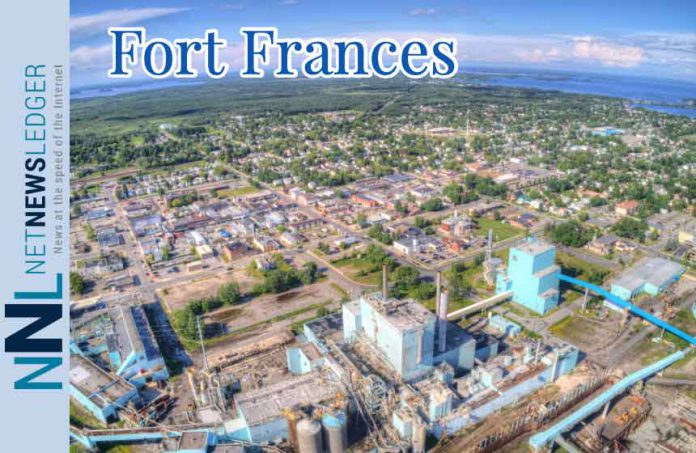
What Fort Frances learned in 2019
By Douglas Judson
FORT FRANCES – OPINION – Last month, the Supreme Court of Canada ruled that a 1985 indemnity from the provincial government would not get Resolute Forest Products off the hook for a mercury waste site near Dryden. Just 200 kilometers away in Fort Frances, the judgment was hailed as comeuppance – a glimmer of the justice that evaded their own 2019 battle with Resolute and the corporate self-interest which thwarted the community’s hopes for the new decade.
With the ball now dropped on a December 31 deadline for the community to find a new operator for its mill, Fort Frances looks to an uncertain future for its role in forest products. Locals question the true legacy of the sweetheart deals granted to local mill owners over the years. The same arrangements which once marshaled their woodlands for local economic benefit now appear to constrict local economic destiny, long after the machines have stopped whirring.
But unlike most single-industry small towns undergoing transition, Fort Frances is under no delusion that its fate was purely inevitable, or that it was a casualty of global economic circumstances. People in Fort Frances pin their current circumstances on deliberate corporate actions and influence which were designed to strip it of its key economic asset, deflect new opportunities for its workforce that might compete with established interests, and to cast a veil over the local public’s rights to govern and benefit from its own forest resources.
A century of papermaking
Fort Frances’ palpable frustration should not be mistaken for resignation or naivety. The ups and downs of a century in papermaking have made the community resilient and astute in its industry. In the shadow of its now-shuttered Resolute facility, its people are proud of their legacy in papermaking – one which saw the pages of Bantam Books and Reader’s Digest roll off of its machines. They see a future in the next generation of forest products, particularly as the world turns to more sustainable alternatives to plastics.
Fort Frances may never have that future without comprehensive policies that empower communities in the use of their local wood fibre, and which are not easily squandered by private agreements and corporate smokescreen.
Their concern is not without basis. The viability of a paper mill (and, in many cases, of a mill town) is based on proximity to a supply of wood fibre. Likewise, a core premise of Ontario’s forest policy is that local trees are to support local industry, and when that industry folds, the harvesting rights become available to a new enterprise. The license held by Resolute for the Crossroute Forest region surrounding Fort Frances is no different.
Political and economic influence
But when Resolute closed its Fort Frances operations in 2014, the Liberal government refused to intervene to enforce this premise of the license. (Many suspect the beneficiary of Fort Frances’ hardship was Thunder Bay – home to another Resolute facility and two cabinet ministers at the time.)
Resolute represented to Fort Frances that it was trying to sell the facility, but its unwillingness to cede control of any wood supply rendered a transaction impossible. New prospects for Fort Frances appear to have been thwarted by the company’s political and economic influence at least twice.
In 2014, Expera – which planned to make investments in the mill to make value-added forest products – was unable to close a deal because Resolute would not play ball, and the Liberals would not facilitate negotiations for access to wood from the Crown forests licensed to Resolute. When community leaders from the region visited Queen’s Park in November 2014, Premier Wynne actually called a last-minute news conference in her office to divert reporters from the Fort Frances delegation.
And in late 2018, Repap Resources emerged. Repap made their case publicly to restart the mill to produce packaging materials, and restore 1,200 jobs to the local economy. With Fort Frances finally represented in the government caucus at Queen’s Park, Resolute created legal obstacles to cloud the public interest – and ergo government involvement – in the future of its mill and forest.
Corporate bully tactics
When Repap met with Resolute, they were confronted with a non-disclosure agreement which would have prevented them from speaking to all levels of government; when Fort Frances’ town council tabled a resolution expressing their concerns about Resolute’s behaviour, they were served with a baseless threat of litigation by Resolute’s lawyers; and when Resolute announced a bidding process for the mill’s assets this year, it declined Repap’s multi-million dollar offer, and sold the property for a nominal sum to a numbered company associated with scrap dealers and other troubled industrial demolition projects.
Once the sale of the mill properties was finalized, the municipality discovered that Resolute had affixed a series of restrictive covenants to the mill’s land title. These are agreements between the seller and new owner which prevent the mill from being used to make most pulp or paper products, and block any new owner from seeking access to wood fibre in the Crossroute Forest – resolving any doubt about whether Resolute ever intended to see the mill open again. The restrictive covenants may actually be legally unenforceable, but the expense to have them challenged in court is a sizeable barrier for a small community, and so long as they remain, they signal risk and delay to new operators.
None of these plays are the hallmarks of good corporate citizenship by a legacy business built upon gracious access to Ontarians’ forests and generous government handouts. No – these are efforts to ensure that a community’s economic engine never operates again. They reflect a deliberate and aggressive campaign to exert dominance over public resources, to bully a small community into silence when its economy is at stake, and to use private transactions and underhanded legal tools to subvert the aims of public policy and strip a town of its potential.
Such heavy-handed tactics may be of questionable legality or legitimacy, but the fog they create provides the cover for plunder that a small community is ill-equipped to ward off.
Unexplained loan forgiveness
To many, it seems that while Resolute has one foot out the door of Fort Frances for good, its other remains firmly planted on its neck – and they have held it there with the aid of some lawmakers, and our own money.
At the same time it allowed Resolute to walk away with Fort Frances’ wood rights, the previous government forgave $23 million in funding that was provided in 2007 for the company to build a biomass boiler at the Fort Frances mill. Resolute’s filings with the U.S. Securities and Exchange Commission disclose that Ontario provided Resolute with 9 consecutive deadline extensions after it closed the Fort Frances mill. The province finally succumbed to Resolute’s pressure and waived the the entire loan before the 2018 provincial election.
In effect, Resolute was allowed to pocket taxpayer funds that were intended to support the operation of the very mill it closed just a few years later. There is no clear indication that the Liberal government took any steps to put in place conditions which would protect Fort Frances or the public investment made in its mill. The current Minister of Natural Resources and Forestry has declined to disclose any of the terms of that agreement.
Moving forward
Even if the mistakes of the past cannot be undone, Fort Frances worries that the deck is stacked against its future in forestry too, at a time when sustainable forest products should be flourishing. The Crossroute Forest is currently being transitioned into a new provincial licensing model which is supposed to confer a greater role to local communities in the governance of their forest region. This is an enlightened contrast from the current framework, within which a single corporate licensee holds all of the cards.
But this too may not be as advertised. Ministry materials state that to complete the transition to the new model, Resolute must voluntarily transfer its existing license to the new framework. Obviously, after the year they have had, few in Fort Frances believe that Resolute would do so on terms which create favourable conditions for new entrants or their community, nor does there appear to be any basis for giving Resolute a veto under the relevant legislation. By gifting Resolute the pen to write its own rulebook, has the Ministry paved the way for a lopsided license, and no clear path for new entrants to this forest region?
This tale is discouraging, to say the least, but its upshot is also instructive. With the clock still faintly ticking on the future of Fort Frances’ mill, it’s clearer than ever that Resolute’s grip over the forest remains a barrier to courting new industrial suitors for the community. The restrictions on the property have been repeatedly identified as deal-breakers for new operators for the mill, while questions remain about the impermeability of the new forest license model.
Admittedly, significant public commitments have been made by the Ford government that wood fibre will be made available if a business case is brought forward for the community or its mill. However, it seems that no opportunity may land so long as the runway is obstructed by policies which validate corporate overreach and pseudo-ownership over public assets.
For its part, Fort Frances was once a community of company men and women. But naked corporate ambition and monopolizing of public resources have left the last of those loyalties in the 2010s. Their experience calls for public policy and legislation which penalizes aggressive corporate behaviour that defies the public interest and role in their local resources and that strengthens the core motives of our forest policy.
Many challenges of the 2020s require that we give primacy to social license and public interest considerations. It’s time to turn the page on the despotism of mill barons in favour of an emboldened role for the communities whose destinies are tied to their local forests.
Douglas W. Judson is a lawyer and municipal councillor in Fort Frances, Ontario. The views expressed are his own. Contact him at info@douglasjudson.ca or @dwjudson.






